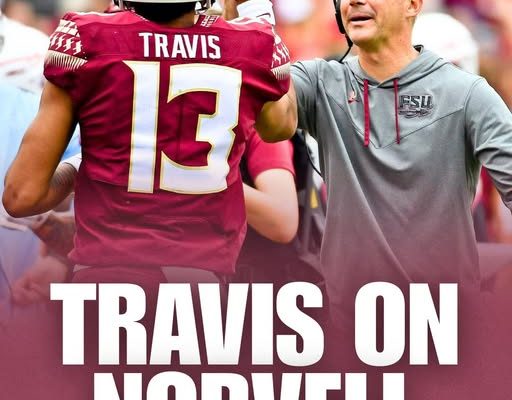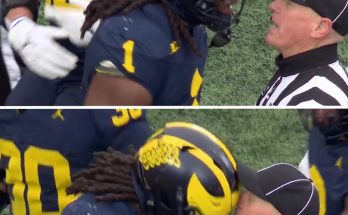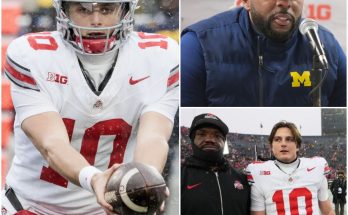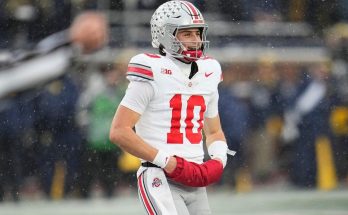Florida State quarterback Jordan Travis has always worn his heart on his sleeve, but his latest statement on social media showed just how deeply his loyalty runs — not only to his team, but to his head coach, Mike Norvell. In a college football landscape often dominated by NIL deals, transfer portals, and fleeting allegiances, Travis’s words felt refreshingly human. They were a reminder that behind every highlight reel and box score lies a real bond between players and the leaders who shape them.
“If y’all don’t expect me to fight for the man that helped change my career and life… idk,” Travis wrote. “My tweets are not intended to hurt y’all’s feelings. I’m going to fight for him every day. We have different opinions, it doesn’t mean yours isn’t valid. Love y’all. I just wanna win too.”
In that brief message, Travis said more about the modern athlete-coach relationship than any press conference or pregame interview ever could. His words came at a time when social media debates about coaching decisions, play-calling, and leadership at Florida State had reached a fever pitch. Critics had begun questioning whether Norvell was still the right man to lead the Seminoles back to national prominence. But for Travis — a player who lived through the transformation of FSU from a struggling program to a contender — there was no doubt where his loyalty stood.
Jordan Travis’s journey under Mike Norvell has been nothing short of transformational. When Norvell arrived in Tallahassee, the Seminoles were searching for stability after years of turbulence. Travis, once a transfer from Louisville, was battling for confidence and consistency. His potential was obvious — the quick feet, the creativity, the spark — but he lacked a system that truly believed in him. Norvell saw something in him that others didn’t. He gave him time, trust, and a voice in the offense.
What followed was one of the most inspiring player-coach partnerships in recent college football memory. Under Norvell’s guidance, Travis evolved from a dynamic scrambler into a complete quarterback. He became the heartbeat of the Seminoles, leading them through adversity and helping restore belief in a fan base desperate for a return to greatness.
To understand why Travis felt compelled to defend Norvell so passionately, one has to look at what they’ve built together. Norvell’s coaching philosophy is rooted in personal connection and accountability — not just the X’s and O’s. For players like Travis, that approach creates a bond that transcends the field. It’s mentorship mixed with brotherhood, structure mixed with empathy. Norvell didn’t just coach Travis; he challenged him to lead, to stay calm through chaos, to represent Florida State with integrity.
That’s why when fans or commentators question Norvell’s methods or his place in the program, it hits differently for someone like Travis. He’s not just defending his coach — he’s defending the man who believed in him when few others did. The man who shaped the culture that gave his college career meaning.
There’s also an honesty in Travis’s message that reflects the emotional complexity of being a college athlete today. He acknowledges that people have “different opinions” and that criticism doesn’t mean someone’s wrong. It’s a mature acknowledgment that social media discourse can often divide fan bases, turning passion into toxicity. But he also makes clear that his loyalty isn’t up for debate.
“I just wanna win too,” he says. And that line might be the most telling of all. It’s not just about defending Norvell; it’s about reinforcing that the entire program shares the same goal — to compete, to improve, and to win. In a world where every play is analyzed and every decision questioned, that simple desire for unity and victory is often lost. Travis’s message brought it back into focus.
For many Florida State fans, this moment resonated beyond football. It was a reminder of how deep the connection between players and coaches can run when built on respect and trust. In an age when players often transfer the moment adversity hits, Travis’s commitment to Norvell is a statement about loyalty and gratitude. It’s about remembering who stood beside you when things weren’t easy.
Those who have followed Travis’s career know how much he’s grown — not just as a player but as a leader. He’s faced injuries, doubt, and the weight of expectations from a program with championship DNA. Through it all, Norvell’s belief never wavered. That kind of support doesn’t just build athletes; it builds men.
In many ways, Jordan Travis’s post is an extension of the culture Norvell has been trying to instill since his arrival at FSU: accountability, passion, and togetherness. It’s easy to preach “family” in college football — much harder to live it when the critics are loud and the scoreboard doesn’t go your way. But Travis’s words are proof that those values have taken root.
It’s also a glimpse into how athletes today are navigating the pressures of modern sports. Social media has given players a voice, but it has also opened the floodgates for instant feedback, often harsh and personal. Travis could have stayed silent, letting the noise play out. Instead, he chose to speak — not out of anger, but out of conviction. His tone wasn’t defensive; it was heartfelt.
That authenticity is what makes Jordan Travis stand out, both on and off the field. He’s not just the face of Florida State football; he’s become a reflection of what it means to lead with integrity. His willingness to stand up for his coach, even in a public arena, shows a kind of maturity and courage that fans — and teammates — notice.
And perhaps that’s what makes his message so powerful. It wasn’t about blind loyalty. It was about respect. It was about gratitude. It was about standing by someone who stood by you first.



